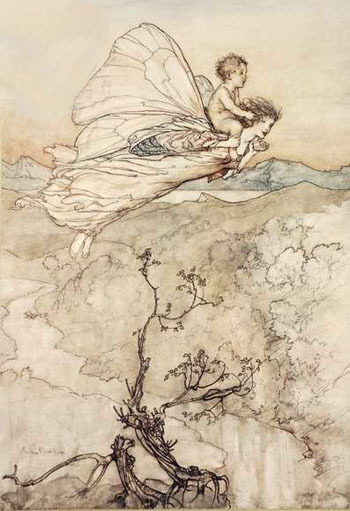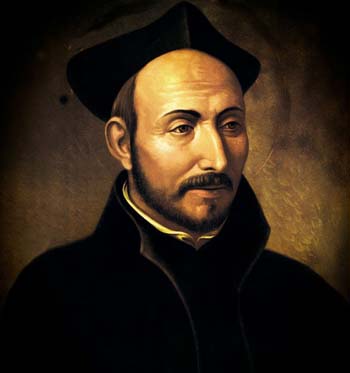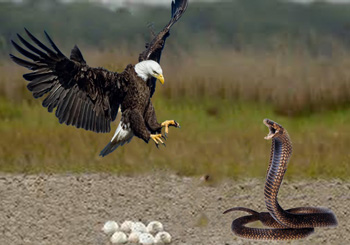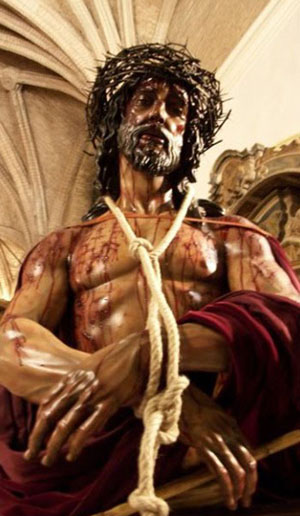Catholic Virtues
 |
 |
 |
 |
 |
 |
 |
True & False Paths to Happiness - VII
Innocence Reaches its Plentitude as One Matures
"Innocent spirit!" This expression often has a negative connation: "He is naïve!" "Childlike." "Living in a dream world." Not necessarily, I respond. The true innocent spirit is not like this.
Innocence is not a privilege of childhood, but can be maintained until the end of one's life. For all men have in the depths of their spirits the model ideal of all things. And, if they have not committed revolutionary infidelities against the order established by God in Creation, they are able to find these ideal models in themselves. With these models, it is not so difficult to achieve the inner harmony of soul that characterizes innocence.
 As a man becomes an adult, he begins to think about his biography, what he wants, what he is going to do, what he will be. This new horizon gives him an architectonic idea of himself and what will take place in his future. This new stage tends to dissociate himself from the birds and butterflies of his childhood.
As a man becomes an adult, he begins to think about his biography, what he wants, what he is going to do, what he will be. This new horizon gives him an architectonic idea of himself and what will take place in his future. This new stage tends to dissociate himself from the birds and butterflies of his childhood.
Then enters the temptation that the images of his childhood innocence were only fantasies, since they have no place in the new reality. Reality is to know if you are going to have a great career. One must live for this. One must set aside or numb those memories of the past, including those battles of one's youth. They were just childhood dreams.
His obsession becomes to be a prosperous lawyer, a wealthy merchant, a well-placed engineer, a highly respected doctor, an illustrious journalist or a prestigious professor. Comparing himself with his colleagues, he thinks: "I see my friends and associates are climbing the mountain of time in a well-paced march. Am I in step with them? Am I in the right place?"
It is the crisis of maturity. In this crisis, what is the role of innocence?
Since the intelligence is more mature, the birds of innocence – to use this metaphor – can sing a new song to us. Victory in the crisis of maturity leads man to think much more about the afterlife. Innocence is, then, like the spire of the Church of Notre-Dame that points upward.
True innocence is sagacious & astute
Innocence – in the specific sense adopted in this series – does not consist only in not losing something, as has already been said, but rather it is an internal order of the spirit, which is harmonious, calm and filled with idealism.
 A question then arises: What relationship is there between this internal order caused by innocence and the external vision of things? What relationship exists between this vision and happiness? For clearly the internal order necessarily influences the external vision of the world, and vice versa.
A question then arises: What relationship is there between this internal order caused by innocence and the external vision of things? What relationship exists between this vision and happiness? For clearly the internal order necessarily influences the external vision of the world, and vice versa.
Through a whole gamut of affinities, the innocent soul seeks outside of himself what corresponds to his internal state. Thus, he will seek what is good, true and beautiful.
Likewise, he makes an almost instinctive rejection of what is bad, false and ugly that is symmetrical to the attraction he feels for what is good, true and beauty. In this regard, he can be a severe critic of what he knows to be wrong, displaying signs of an astuteness and sagacity in his rejection.
Therefore, the truly innocent spirit is not naïve and does not allow himself to be fooled by appearances. His soul's alarm sirens are sensitive and sound out at the slightest touch. If someone has true innocence, it will not be easy to deceive him.
To make a comparison, regarding health, the healthy man understands the state of illness better than the sick man; and, just as it is not necessary to fall ill to learn how to avoid sickness, it is not necessary for the innocent man to lose his innocence in order not to be naïve. Likewise, just as a very upright man understands dishonesty better than someone who is dishonest, so also the innocent man understands evil better than someone who is not innocent.
One who has the spirit of admiration can have great insights, but to achieve this he must be adamantinely limpid, golden and upright.
 To be very astute, you do not need to have a skewed temperament. By his love for the good, the innocent soul understands what the sinuousness of evil is like and, without inhaling anything twisted in his soul, he perceives the serpent coming from a far distance, and knows how to inflict on it the fatal blow.
To be very astute, you do not need to have a skewed temperament. By his love for the good, the innocent soul understands what the sinuousness of evil is like and, without inhaling anything twisted in his soul, he perceives the serpent coming from a far distance, and knows how to inflict on it the fatal blow.
There are two ways a person can be astute: To remain on the same plane as the sinuous enemy who advances, or to place himself atop a mountain so that, without entering the winding paths, he see the serpentine enemy making his way: "Ah! I see you and I know where you are coming from. I know you well not because I sympathize with you, but because I detest you."
This must be the sagacity of the innocent souls of all ages.
This is the astuteness of Our Lord when He said: "Give to Caesar what belongs to Caesar and to God what belongs to God..." (12:17) Our Lord Jesus Christ replied to the Pharisees who perfidiously came to question Him in the Temple as if from atop a mountain. And He replied in all truth, for His answer was of the highest fidelity to Truth and, therefore, an appropriate response to a Pharisee.
Thus is there a golden light in innocence that does not turn into darkness to enter the darkness, but rather that light tears through the darkness!
Consequently, the truly innocent spirit is that of a combative man – not that of a sweet, unrealistic dreamer. He reaches the summit of innocence by challenging evil, entering into combat with it, and totally rejecting it.
Innocence & nobility of soul
The matrix of all that is noble lies in the depths of the human soul, making it capable of loving everything, and even itself, for the love of God. Thus it distinguishes itself from that animalistic love that man has for himself, which is the matrix of all vulgarity, all lowness of soul, all turpitude.
We must not love God because He gives us success, but rather because God is God! This entirely disinterested position should not demand any form of reward.
 We find the proper spirit of love of God in this perfectly structured Spanish poem by St. Teresa of Avila. It portrays well the love of an innocent soul for his Creator.
We find the proper spirit of love of God in this perfectly structured Spanish poem by St. Teresa of Avila. It portrays well the love of an innocent soul for his Creator.
I am not moved, my God, to love Thee
By the Heaven Thou hast promised me;
Nor does the Hell so feared move me
To stop offending Thee.
Thou art what moves me, Lord;
It moves me to see Thee nailed on a cross and mocked,
It moves me to see Thy Body so wounded,
I am moved by the affronts to Thee and Thy death
I am moved, in the end, by love for Thee, and so greatly,
That even if there were no Heaven, I would still love Thee;
And even if there were no Hell, I would still fear you.
Thou does not have to give me anything to make me love Thee,
For even if I did not hope for what I hope for,
I would love Thee the same as I love Thee.
Continued

Innocence is not a privilege of childhood, but can be maintained until the end of one's life. For all men have in the depths of their spirits the model ideal of all things. And, if they have not committed revolutionary infidelities against the order established by God in Creation, they are able to find these ideal models in themselves. With these models, it is not so difficult to achieve the inner harmony of soul that characterizes innocence.

The world of innocence starts to look like a unreal fairy world one must leave to be an adult
Then enters the temptation that the images of his childhood innocence were only fantasies, since they have no place in the new reality. Reality is to know if you are going to have a great career. One must live for this. One must set aside or numb those memories of the past, including those battles of one's youth. They were just childhood dreams.
His obsession becomes to be a prosperous lawyer, a wealthy merchant, a well-placed engineer, a highly respected doctor, an illustrious journalist or a prestigious professor. Comparing himself with his colleagues, he thinks: "I see my friends and associates are climbing the mountain of time in a well-paced march. Am I in step with them? Am I in the right place?"
It is the crisis of maturity. In this crisis, what is the role of innocence?
Since the intelligence is more mature, the birds of innocence – to use this metaphor – can sing a new song to us. Victory in the crisis of maturity leads man to think much more about the afterlife. Innocence is, then, like the spire of the Church of Notre-Dame that points upward.
True innocence is sagacious & astute
Innocence – in the specific sense adopted in this series – does not consist only in not losing something, as has already been said, but rather it is an internal order of the spirit, which is harmonious, calm and filled with idealism.

St. Ignatius, innocent & astute
Through a whole gamut of affinities, the innocent soul seeks outside of himself what corresponds to his internal state. Thus, he will seek what is good, true and beautiful.
Likewise, he makes an almost instinctive rejection of what is bad, false and ugly that is symmetrical to the attraction he feels for what is good, true and beauty. In this regard, he can be a severe critic of what he knows to be wrong, displaying signs of an astuteness and sagacity in his rejection.
Therefore, the truly innocent spirit is not naïve and does not allow himself to be fooled by appearances. His soul's alarm sirens are sensitive and sound out at the slightest touch. If someone has true innocence, it will not be easy to deceive him.
To make a comparison, regarding health, the healthy man understands the state of illness better than the sick man; and, just as it is not necessary to fall ill to learn how to avoid sickness, it is not necessary for the innocent man to lose his innocence in order not to be naïve. Likewise, just as a very upright man understands dishonesty better than someone who is dishonest, so also the innocent man understands evil better than someone who is not innocent.
One who has the spirit of admiration can have great insights, but to achieve this he must be adamantinely limpid, golden and upright.

The innocent does not need to be sinuous like the evil ones; he catches the revolutionary his own way
There are two ways a person can be astute: To remain on the same plane as the sinuous enemy who advances, or to place himself atop a mountain so that, without entering the winding paths, he see the serpentine enemy making his way: "Ah! I see you and I know where you are coming from. I know you well not because I sympathize with you, but because I detest you."
This must be the sagacity of the innocent souls of all ages.
This is the astuteness of Our Lord when He said: "Give to Caesar what belongs to Caesar and to God what belongs to God..." (12:17) Our Lord Jesus Christ replied to the Pharisees who perfidiously came to question Him in the Temple as if from atop a mountain. And He replied in all truth, for His answer was of the highest fidelity to Truth and, therefore, an appropriate response to a Pharisee.
Thus is there a golden light in innocence that does not turn into darkness to enter the darkness, but rather that light tears through the darkness!
Consequently, the truly innocent spirit is that of a combative man – not that of a sweet, unrealistic dreamer. He reaches the summit of innocence by challenging evil, entering into combat with it, and totally rejecting it.
Innocence & nobility of soul
The matrix of all that is noble lies in the depths of the human soul, making it capable of loving everything, and even itself, for the love of God. Thus it distinguishes itself from that animalistic love that man has for himself, which is the matrix of all vulgarity, all lowness of soul, all turpitude.
We must not love God because He gives us success, but rather because God is God! This entirely disinterested position should not demand any form of reward.

Contemplating Christ, the innocent soul is moved by His great suffering
I am not moved, my God, to love Thee
By the Heaven Thou hast promised me;
Nor does the Hell so feared move me
To stop offending Thee.
Thou art what moves me, Lord;
It moves me to see Thee nailed on a cross and mocked,
It moves me to see Thy Body so wounded,
I am moved by the affronts to Thee and Thy death
I am moved, in the end, by love for Thee, and so greatly,
That even if there were no Heaven, I would still love Thee;
And even if there were no Hell, I would still fear you.
Thou does not have to give me anything to make me love Thee,
For even if I did not hope for what I hope for,
I would love Thee the same as I love Thee.
Continued

Posted March 30, 2020





